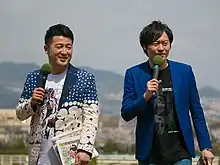Wagyu (comedy duo)
Wagyu (和牛, Wagyū) is a Japanese comedy duo (kombi) consisting of Shinji Mizuta (水田信二) and Kenshirō Kawanishi (川西賢志郎). They are employed by Yoshimoto Kogyo, and are mainly active in Tokyo. They were the runners-up of the M-1 Grand Prix for three years in a row from 2016 to 2018.[1]
| Wagyu | |
|---|---|
 | |
| Native name | 和牛 (Wagyū) |
| Years active | 2006–present |
| Employer | Yoshimoto Kogyo |
| Genres | Manzai Conte |
| Members | |
Members
- Shinji Mizuta (水田 信二), Born April 15, 1980 in Iyo, Ehime. Plays the boke. Mizuta worked as a chef for 7 seven years in Osaka and Kobe before becoming a comedian. He was appointed as the sightseeing ambassador of his hometown Iyo, Ehime in 2018.[2]
- Kenshirō Kawanishi (川西 賢志郎), Born January 29, 1984 in Higashiōsaka, Osaka. Plays the tsukkomi. Kawanishi played rugby throughout middle school and university in the fly-half (stand-off) position.[3]
Life and career
Both Mizuta and Kawanishi were graduates of the Yoshimoto NSC Osaka's 26th generation class. They formed Wagyu in 2006 and spent the first year and a half struggling for performance opportunities in live theatres.
From 2008 to 2012, Wagyu gained popularity through various manzai and comedy competitions, making it to the semi-finals in the M-1 Grand Prix 2009 and King of Conte 2010. In 2013, Wagyu became regulars on various variety programs and were known mainly for their manzai, which got them to the finals of The Manzai in 2014 and M-1 Grand Prix in 2015.
Wagyu's popularity increased in 2016 after again making it to the finals of M-1 Grand Prix by winning the Second Chance competition. They were the fastest selling young comedians of Yoshimoto with live tickets often sold out instantly.[4] They then moved to Tokyo to further their career in 2017,[5] and held live tours across the country.[6] They were finalists in M-1 Grand Prix in 2017 and 2018, marking 4 consecutive years as a finalist and 3 consecutive runners-up from 2016 to 2018.[7]
References
- 『「和牛」またしても…史上初の3年連続の準優勝 最終決戦で1票差で敗れる』 (Sponichi News) 2018-12-02
- 『和牛水田が伊予観光大使に、川西は観光大使応援隊長としてサポート』 (Owarai Natalie) 2018-08-27
- 『ラグビーワールドカップ2011応援企画 裏・口だけJAPAN』(J SPORTS)2011。
- 『今、最もライブチケットが取りにくいと言われる芸人「和牛」初DVD『和牛 漫才ライブ2017~全国ツアーの密着ドキュメントを添えて~』発売決定!』(タワーレコード)2017-09-04
- 『和牛、M-1優勝以外は全部よそにくれてやる』 (Natalie) 2017-12-01
- 『和牛、M-1王者になるための全国ツアー「ほか全部くれてやるから絶対欲しい」』(Natalie) 2017-05-20
- 『V候補本命の和牛が1票届かず…3年連続M1準優勝』 (Nikkan Sports) 2018-12-02